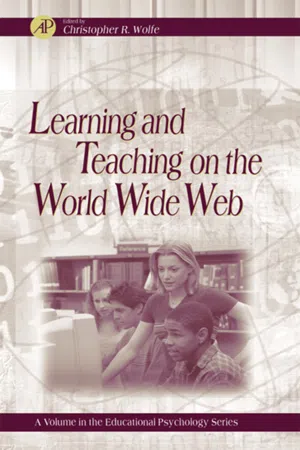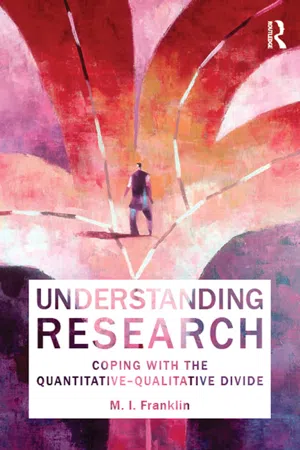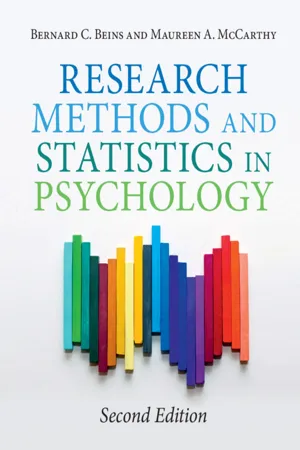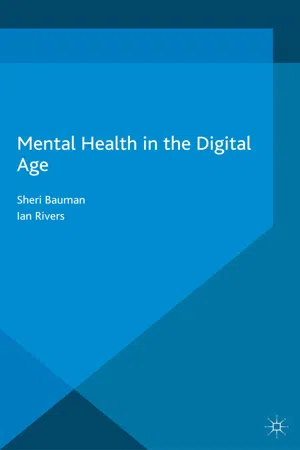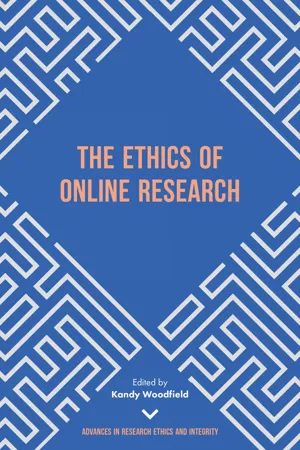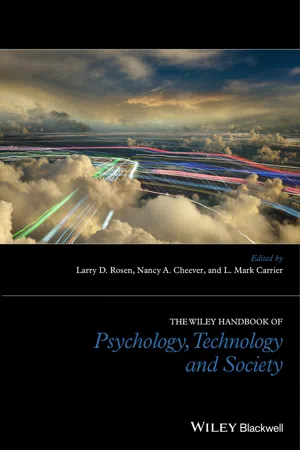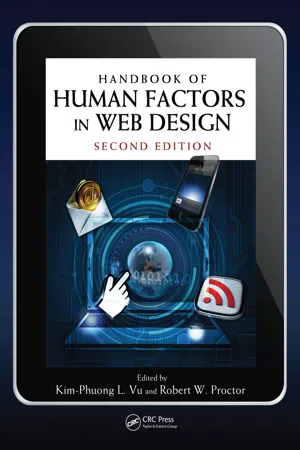Psychology
Online Research
Online research in psychology involves using digital resources such as academic databases, online journals, and websites to gather information and data for research purposes. This can include literature reviews, surveys, and experiments conducted through online platforms. It is important to critically evaluate the credibility and reliability of online sources when conducting research in psychology.
Written by Perlego with AI-assistance
Related key terms
1 of 5
10 Key excerpts on "Online Research"
- eBook - PDF
- Christopher R. Wolfe(Author)
- 2001(Publication Date)
- Academic Press(Publisher)
identification and investigation of factors which may affect the design — and success — of on-line learning paradigms, and the exploration of the context in which these paradigms are implemented. In fact, given the attrac-tiveness of the new technologies available to us, it is essential that the psychological factors underpinning “what works” in on-line teaching be understood. As is the case with off-line computerized teaching packages, the best are likely to be those which are driven by sound pedagogical principles, rather than those being showcases for the latest technology. On-line psychological research, then, is not just an exciting and innova-tive extension to our existing methods for exploration of many aspects of human behavior, it is also crucial to the success of learning and teaching on the World Wide Web (WWW or Web). B. Issues in On-line Research There are many ways in which the Internet can be used in teaching and learning, and many opportunities for both theoretical and applied research on the psychology of on-line education. Such research may be considered a subarea (though an important one) of on-line psychology research in general, and will be informed by the lessons learned — and potential problems identified — in the broader field to date. It may be useful to clarify exactly what we mean by “on-line psychological research.” There are in fact two main (overlapping) spheres of activity that could be described in this way. One is an extension of the longstanding social-psychological tradition of research into computer-mediated commu-nication (CMC), which is now informing our understanding of how people interact and behave “on the Internet” (in this volume see Sherman, chapter 6, and Riva, chapter 7, for more on CMC). The implications of what we already know about the psychology of on-line behavior will be addressed later in this chapter. - Lorelle J. Burton, Drew Westen, Robin M. Kowalski(Authors)
- 2022(Publication Date)
- Wiley(Publisher)
Those changes are happening so rapidly that the full implications for our world are still unclear. However, what is clear is that just as internet technologies are changing all aspects of our life, so too are they impacting the way psychology research takes place. In many ways, the opportunities that these technologies open up are extremely exciting. But just as in wider society, there are also some challenges that need to be considered as we adapt to the online universe. Positive opportunities for psychology research In many cases, internet technologies simply represent a new medium for carrying out what would be considered core research activities in psychology. The benefits of using these technologies come from Pdf_Folio:223 CHAPTER 5 Research methods in psychology 223 their ability to access, automate and process data quickly and easily. Some key advantages include the following (British Psychological Society, BPS, 2007; Kraut et al., 2003). 1. Online sources provide easy access to existing research and data about your topic. Rather than physically visiting libraries to gather data from paper-based sources, the latest research from around the world is now literally available at your fingertips. 2. Internet technologies offer fantastic opportunities to recruit participants for testing. The wide pene- tration of internet access makes it easier to achieve sampling goals, with the ability to stratify across particular demographics. 3. There are cost and efficiency benefits from using this technology. Paper-based survey instruments can incur significant postage and collation costs, which the internet can overcome. Internet platforms can also avoid the need to bring people into a central location to be part of a test. This is not only less costly, but a more efficient way of reaching people who might be spread over wide geographic areas. 4. Automation of data entry and collection also cuts down on costs.- eBook - ePub
Understanding Research
Coping with the Quantitative - Qualitative Divide
- M.I. Franklin(Author)
- 2012(Publication Date)
- Routledge(Publisher)
Some of these point to particular skills needed for doing effective internet-based research; technical practicalities about finding and using internet resources. Others overlap with topics covered in previous and subsequent chapters, fuelling debates about the legitimacy if not the practicability of not only Online Research but also web-based literature and information. They cut across all modes of research in terms of the challenges and opportunities presented by the internet as a research tool and the web as a research terrain.The main distinction for research that occurs at any point between each end of the qualitative and quantitative spectrum is the degree to which the automated and computational powers of content-analysis software, web-based survey tools, and statistical programs are put to use. This chapter concentrates on the following aspects to conducting Online Research, and related internet research skills:- finding academic resources on the web;
- best practices when re/searching the web;
- using software packages and web-based research tools;
- referencing, archiving, and presenting web-based findings;
- ethical and legal issues;
- emerging web-based, web-driven methods and topics.
For some skills, such as locating and organizing literature and other sources of information, and methods like surveys or interviews, best practices for conducting these effectively in ‘real life’ – offline – also apply online. But they also bring with them particular pitfalls for web-based situations.In the second instance, designing an Online Research project confronts researchers sooner or later with a number of practical and ethical decisions; for example, the rights and obligations for anyone wanting to research password-protected groups on the web, if not observe interactions taking place in open-access spaces. Research into computer games or computer simulations also brings with it issues specific to the way data, and research subjects, have acquired digital form and corollary computer-coded legal identities in recent years: the IP address of your computer, or the repertoire of login names and passwords that many of us need for everyday and scholarly internet access are cases in point. - eBook - ePub
- Nalita James, Hugh Busher(Authors)
- 2009(Publication Date)
- SAGE Publications Ltd(Publisher)
THREEDeveloping Online Research Strategies:a Methodological Discussion
Overview: this chapter examines qualitative methodologies and methods that have used online communications as a platform for collecting interview data. It also examines the opportunities for developing and understanding Online Research practices. This will include discussion regarding the conduct of virtual ethnographies. The chapter also considers the significance of combining online/virtual and offline/real interactions with research participants, and the methodological implications this has for Online Research projects.Introduction
In qualitative research projects, researchers have to consider not only the theory of knowledge embedded in the theoretical perspective but also the methodology – the process lying behind the choice and use of particular methods, and how these link to the desired outcomes. Such considerations prompt us to examine how the Internet can (re) shape Online Research, and the extent to which researchers can explore the Internet not only as a domain for investigation but as a site in which research methods can be adapted (Bryman, 2004: 473). Researchers’ knowledge and understanding of Internet technologies is constructed by ‘… the methods through which we choose to know them and the underlying epistemological commitments on which those methods rely’ (Hine, 2005: 7). However, when conventional research methods are employed in a virtual site that is faceless and are unbounded by time and space, the use of such methods may have social consequences for participants. Additionally, researchers cannot be sure that their participants’ understanding of the Internet will be the same as theirs, nor can they be assured that their choices of the medium will reflect the experiences of their participants (James and Busher, 2006). - Bernard C. Beins, Maureen A. McCarthy(Authors)
- 2018(Publication Date)
- Cambridge University Press(Publisher)
It is hard to imagine that a behavioral researcher could study reinfor- cement or punishment without having direct contact with whomever is being observed. If devel- opmental psychologists want to see whether an infant will cross a visual cliff, parents must bring the infant to the laboratory. On the other hand, psychologists may easily accomplish research at a distance that involves experimental manipulations or judgments of opinion and attitude. For such studies, it has been common to bring participants to the laboratory for the research or to mail the materials. (Unfortunately, people often do not mail them back.) With the advent of easy access to the inter- net, we no longer need to be in the physical presence of those who agree to participate in such research, and we don’t need to go to the trouble and expense of mailing anything. The concept of the laboratory is undergoing adjustment; it can be world-wide in scope. Table 3.1 presents some examples of actual web-based research. Creative researchers should be able to use the internet to good effect. 3.4.1 Internet Research Internet research has increased dramatically in psychology. However, investigators worry about the validity of data collected on the internet; that is, when people complete a study online, will they be as fastidious in completing tasks as traditional, lab-based samples? This question arose as soon as scientists began developing online studies. A further issue involves whether traditional student samples produce the same outcomes as more diverse, nonstudent samples. The answers 3.4 The Virtual Laboratory: Research on the Internet 75 are still somewhat ambiguous, although in many cases researchers are comfortable that the results from online studies are valid. Comparisons have been made of the data collected with students and nonstudents who participate in research laboratories and with survey research conducted on the internet and through the mail.- eBook - ePub
- Sheri Bauman, Ian Rivers(Authors)
- 2015(Publication Date)
- Palgrave Macmillan(Publisher)
Besides opportunities, Online Research also brings a number of challenges and requirements of those who conduct such research. How we rise to those challenges and meet those requirements has yet to be seen. Questions remain about the application of ethics in Online Research and how we engage with participants in such research. However, by airing them here it may be possible for us to learn from the practices of other researchers navigating the World Wide Web and draw up a series of best practice recommendations to support studies in cyberspace.At a minimum, researchers who have questions about how cyberspace affects users or overlaps with the offline world and how they link to mental health will need to consider how they conduct research online and thus it is imperative that ethical questions be raised and discussed in the service of high quality research. - eBook - ePub
- Kandy Woodfield(Author)
- 2017(Publication Date)
- Emerald Publishing Limited(Publisher)
INTRODUCTION TO VOLUME 2: THE ETHICS OF Online Research
Kandy Woodfield and Ron IphofenHOPES AND PROMISES
The Internet, the World Wide Web and social media – indeed all forms of online communications – have been seen as attractive fields of research since their inception for many reasons. Some of the earliest discussion and commentary were eager in terms of the opportunities for methodological initiatives and innovations in research and the ‘attractiveness’ of easily accessed, massive amounts of primary and secondary data sources.Using e-mail as a research tool was seen to potentially offer researchers advantages such as easy access to world-wide samples, low administration costs (both financially and temporally), ready-transcribed data and its unobtrusiveness, and ‘friendliness’ to respondents was also valued (Robson & Selwyn, 1998 ). Once you became an experienced Web ‘surfer,’ you could have access to a wealth of valued and authoritative information sources (Peters, 1998 ). Instant messaging was seen as a cost- and time-effective method for in-depth interviewing (Fontes & O’Mahoney, 2008 ); online participants might be better able to ‘tell their story’ in a way that suits them and so may even be ethically sounder than conventional methods of narrative data collection. Traditional survey methods have long suffered from increasing costs and declining responses rates – Web surveys offered an attractive alternative and have the advantage of ease in collecting more sensitive data: people have been shown to respond to Web surveys on sex and health more readily and openly than in face-to-face interviews (Burkill et al., 2016 ). Glaser, Dixit, and Green (2002 , pp. 177–193, 189–190) argue the case for better access to ‘hard to reach’ groups: ‘the anonymity of the internet permits research into marginal groups for whom self-disclosure may have costs, and where participants may be suspicious of researchers and outsiders.’ And Illingworth (2001 - Chapter 10 Investigating cybersociety: a consideration of the ethical and practical issues surrounding Online Research in chat roomsAndy DiMarco and Heather DiMarcoThe advent and inescapable march of communication and information technologies have presented the social researcher with a whole new set of ideas, concepts and research fields that simply did not exist just a few years ago. Not only does the Internet enable social scientists to access information almost immediately that might previously have taken hours, days or even weeks of painstaking library research, and give us easy contact with other researchers around the world via email, but it also affords us access to numerous new areas of knowledge and experience available on a 24-hour-a-day, 365-day-a-year basis. Many argue that these processes and the opportunities they offer in the spheres of employment, education, commerce, leisure and crime are changing the face of society and of social science forever. Illingworth (2001: 5) sums up this revolution for the researcher: ‘The rapid development of the World Wide Web has lifted the restrictions of geographical boundaries and opened new research horizons…In effect, the Internet provides the research community with the chance to interface with respondents in ways which may overcome some of the barriers imposed by conventional research approaches.’ However, a research approach that transforms traditional modes of interaction and participation between researcher and respondent also inevitably raises new ethical dilemmas and as yet largely unaddressed practical research issues. It might thus be argued that current methodological and ethical guidelines – based in ‘real world’ research – are unsuited to the demands of the Online Researcher. Concepts such as informed consent and confidentiality are based in the research tradition of the last 150 years and may be unadaptable to the world of virtual research (in cyberspace, what is ‘public’ and what is ‘private’? Is entering cyberspace equivalent to going ‘into the field’ or is it not ‘real’?). In fact the rigid and dogmatic application of ‘conventional’ research methods may be a hindrance to Online Research rather than a positive feature. This final chapter will explore these issues, arguing that the dawn of a virtual society – with its different rules, language and culture – requires a fresh approach to research methods and methodology. The chapter will introduce this methodological minefield and offer some points for discussion and debate, before presenting a brief guide to the practicalities of researching in virtual meeting places such as chat rooms.
- Larry D. Rosen, Nancy Cheever, L. Mark Carrier, Larry D. Rosen, Nancy Cheever, L. Mark Carrier(Authors)
- 2015(Publication Date)
- Wiley-Blackwell(Publisher)
Some, such as the British Sociological Association (2002) and the American Psychological Association (2002), did not produce any guidelines per se but instead put the onus on researchers to keep abreast of developments in Online Research. To date, their position remains the same: Members should take special care when carrying out research via the Internet. Ethical standards for Internet research are not well developed as yet … Members who carry out research online should ensure that they are familiar with ongoing debates on the ethics of Internet research. (British Sociological Association, 2002) Other professional bodies, such as the British Psychological Society (BPS, 2007), wrote specific guidelines for Internet research which were already out of date by the time they were released. However, since then, the BPS (2013) has altered its ethical stance and has published “Ethics Guidelines for Internet‐Mediated Research” (IMR), which they consider to be supplemental and subordinate to their overarching Code of Ethics and Conduct for Psychologists. Unlike the earlier version, it is made clear that these guidelines are not intended to be used as a rulebook, but instead as a set of guid- ing principles. Furthermore, it is explicitly stated that the BPS recognizes that the online environment is one which undergoes regular and rapid change and that over time, “new considerations are likely to become salient.” Consequently, the BPS calls for a “return to ‘first principles’ and an informed application of general ethical princi- ples to the new situation” (BPS, 2013, p. 5). Four key principles are thus outlined by the BPS. Respect for autonomy and the dignity of persons concerns issues such as consent, confidentiality, anonymity, and pri- vacy of research participants. Social responsibility involves maintaining respect for and avoiding disruption to social structures, and a consideration of the consequences and outcomes of research.- eBook - PDF
- Kim-Phuong L. Vu, Robert W. Proctor, Kim-Phuong L. Vu, Robert W. Proctor(Authors)
- 2011(Publication Date)
- CRC Press(Publisher)
Internet-based. experiments. . Behavior Research Methods, Instruments, and Computers 33:.179–186 . Frick,.A ., .M . .T . .Bächtiger,.and.U .-D. .Reips . .2001 . .Financial.incen-tives,. personal. information,. and. drop-out. in. online. studies . . In. Dimensions of Internet Science ,.eds . .U .-D. .Reips.and.M . . Bosnjak,.209–219 . .Lengerich:.Pabst.Science . Fraley,.R . .C . .2004 . . How to Conduct Behavioral Research over the Internet: A Beginner’s Guide to HTML and CGI/Perl . . New. York:.The.Guilford.Press . 584 Handbook of Human Factors in Web Design Francis,. G ., .I . . Neath,. and.A . .M . . Surprenant . . 2000 . . The. cognitive. psychology.online.laboratory . .In. Psychological Experiments on the Internet ,. ed . .M . .H . . Birnbaum,. 267–283 . . San. Diego,. CA:.Academic.Press . Funke,. F ., . and. U .-D. . Reips . . 2007 . . Messinstrumente. und. Skalen. [Measuring. devices. and. scales] . .In. Online-Forschung 2007: Grundlagen und Fallstudien ,.eds . M. .Welker.and.O . .Wenzel,. 52–76. .Köln:.Herbert.von.Halem . Garrett,. J . . J . . 2005 . . Ajax:. A. new. approach. to. Web. applications . . http://www.adaptivepath.com/ideas/essays/archives/000385 . .php .(accessed.Feb . .8,.2010) . Göritz,.A . .S . .2006 . .Web-based.data.collection . .Retrieved.April.10,. 2010,.from.http://www .goeritz.net/ati/material.pdf. Göritz,.A . .S . .2007 . .Using.online.panels.in.psychological.research . . In. The Oxford Handbook of Internet Psychology ,.eds . .A . N. . Joinson. et. al ., . 473–485 . . Oxford,. UK:. Oxford. University. Press. Göritz,.A . .S . .2009 . .Building.and.managing.an.online.panel.with.PHP. PanelAdmin. . Behavior Research Methods 41(4):.1177–1182 . Göritz,.A . .S ., .and.M . .H . .Birnbaum . .2005 . .Generic.HTML.form.pro-cessor:.a.versatile.PHP.Script.to.save.Web-collected.data.into.a. MySQL.database . . Behavior Research Methods .37:.703–710 . Hardin,. C ., . and. M . . H . . Birnbaum . . 1990 .
Index pages curate the most relevant extracts from our library of academic textbooks. They’ve been created using an in-house natural language model (NLM), each adding context and meaning to key research topics.
